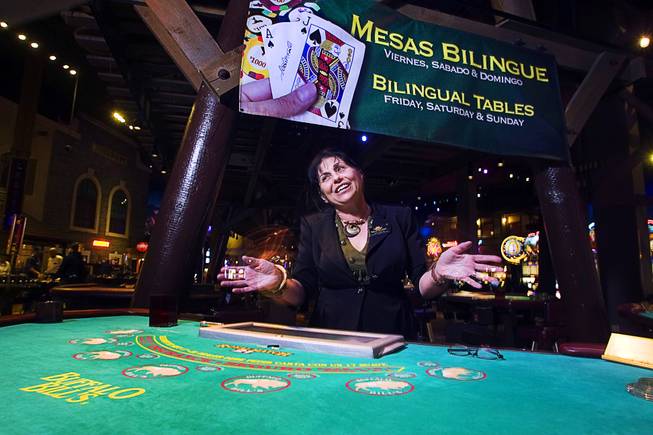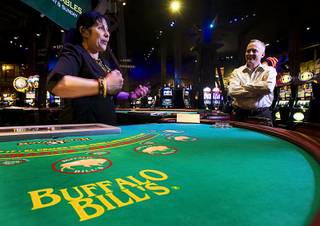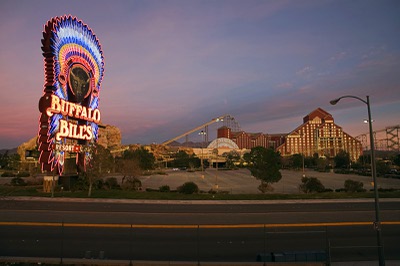
Maria Macedo, a Cuban-born table games supervisor, says the bilingual tables are among the most popular at Buffalo Bill’s in Primm.
Tuesday, Jan. 18, 2011 | 2 a.m.
Sun Archives
- Gaming Commission approves Herbst reorganization (12-16-10)
- Regulatory board OKs company to run Herbst Gaming (12-2-10)
- Buffalo Bill’s at Primm to close temporarily for renovations (11-29-10)
- Primm’s lure: Freebies (7-2-2009)
- Herbst Gaming files for bankruptcy protection (3-22-2009)
- Betting it all on bankruptcy? (3-17-2009)
- Reports: Gaming revenue down, casino debt climbing (1-30-2009)
- Herbst misses debt payment, again (12-4-2008)
Beyond the Sun
Map
Last year, the head of marketing for Primm Valley resorts pitched his boss on an $85,000 entertainment act to fill the 6,500-seat arena at Buffalo Bill's, one of three budget hotels the company operates in Primm.
It seemed a princely sum to pay for a portly accordion player with Elvis-style sideburns and gaudy western wear who sings in Spanish — a man neither he nor his boss had ever heard of before.
Vice President of Marketing Stuart Richey was willing to wager that the accordionist, Ramon Ayala, would attract a sellout crowd of gamblers and help fill the company’s hotels on the California-Nevada border, 45 miles from Las Vegas.
Ayala, a star in his native Mexico, has made more than 100 albums over his nearly 50-year career playing a style of music called “norteño” for its origins in northern Mexico. Although still foreign to American ears, its polkalike beat has grown ubiquitous on U.S. radio stations and in cities large and small that are now home to the country’s swelling Mexican-American community.
The Oct. 16 Ayala concert, which drew 10,000 people to the three Primm casinos that weekend, was a landmark moment for Buffalo Bill’s — and a lesson for Nevada’s struggling casino industry.
“It was like New Year’s Eve, only busier,” said Richey, who previously ran the marketing department at Stratosphere before joining the Primm chain in 2009. “We realized there was pent-up demand for this kind of experience.”
Hispanics, the nation’s largest and fastest-growing minority, are rapidly becoming a majority of the population in Southern California, Las Vegas’ largest feeder market. It’s also a relatively young population, with a median age of 27 versus 37 for the nation as a whole, according to recent census estimates. That bodes well for an industry with slowing growth prospects in the United States and an aging customer base.
Yet the Hispanic marketing efforts of Las Vegas casinos are largely confined to occasional “Latin night” events or musical acts, and plans for new casinos catering to Spanish speakers haven’t come to fruition — in part because of lingering doubts that Hispanics will have the money to spend.
Such perceptions are shortsighted, as Hispanics tend to come in large groups that can yield big dollars for casinos, said Jim Medick, president of Precision Opinion, a Las Vegas-based market research firm that has surveyed Spanish-speaking customers for California casinos that are increasingly marketing to Spanish speakers with entertainment, menu items and bilingual staff.
“They don’t spend as much per visit but they come more frequently, in large groups of friends and extended family,” Medick said. “They tend to be very loyal to the casinos where they feel comfortable. And they’re undemanding customers who are happy just drinking beer and playing slots.”
Las Vegas casinos expend more resources wooing a relatively small group of Asians with a higher propensity to gamble, however. A significant number of Las Vegas dealers are Asian, and casinos roll out the red carpet for holidays celebrated in Asian communities, such as Chinese New Year.
Instead, Buffalo Bill’s is welcoming Spanish speakers year round with its “Serie de Conciertos Latinos,” a schedule featuring such Mexican celebrities as Los Tigres del Norte and Jenni Rivera. It hosts boxing events featuring little-known fighters with a local following among California Hispanics who are already casino customers.
The Primm casinos can little afford to take risks. They have struggled financially in the recession, which has hurt business from California and forced more luxurious casinos to compete in Primm’s price range. They are mostly empty during the week. The lowest-rent of the three, Whiskey Pete’s, doesn’t take hotel guests then, and instead diverts them to rooms at Buffalo Bill’s and Primm Valley to trim labor costs. The properties exited Chapter 11 bankruptcy this year under new ownership, reducing the casinos’ crippling debt load by $750 million and clearing the slate for “optimistic” revenue growth this year, Richey said.
The Latin headliners are paying off with a mostly Hispanic audience from California descending on the three casinos those weekends, booking all of Primm’s 2,650 rooms, clogging parking lots and filling more than 50 charter buses. The business has been a lifesaver for properties that largely depend on people making a pit stop on their way to Las Vegas and are lucky to attract a few thousand customers for a special event, Richey said.
On the gambling floor, a surprise awaits: Two blackjack tables labeled “mesas bilingue” with felts bearing the universally known language for blackjack, “21,” as well as a Nevada first: “el dealer debe pedir carta con un 17 suave.” (In English: “dealer must hit soft 17.”)
At the tables, dealers speak Spanish and English with customers under the watchful eye of Maria Macedo, a Cuban-born table games supervisor with 26 years of casino experience.
The night of the Ayala concert, Macedo addresses curious onlookers in Spanish and encourages them to sit down and play — an unusual sight in an industry that discourages table games players from speaking languages besides English.
Would-be players wave others over to the table with an “Ella habla español!”
(Casino regulators generally recommend that casinos have bilingual supervisors who can understand the language their customers are speaking to avoid potential collusion between players and dealers in a language supervisors can’t understand. Many supervisors lack such skills, however, which is why casinos prefer that players speak English.)
Some gamblers no doubt played their first hand of blackjack that night, while others grew more comfortable with the game, chatting up other players and staff rather than gambling in silence — or guessing at their next move.
“One older lady from Mexico said she knew how to play but wasn’t comfortable speaking English in public, so she didn’t play,” Macedo said, shaking her head. “We should have had this a long time ago.”
Over the course of the night, Spanish speakers spill over to nearby blackjack and craps tables and the crowd grows festive, singing songs and laughing. Non-Spanish speakers sit down and take part in the carousing and joking, trading blackjack pointers that may or may not be completely understood.
There’s typically a line of people two or three deep waiting to play at the bilingual tables, which are available Friday through Sunday.
“People want to play at the Spanish tables because they can see them having fun. They didn’t want to sit with the serious people,” Macedo said.
With no English-language staff to navigate, nearly 80 percent of the casino’s slot machines are occupied on Latin concert nights, Richey said.
“Having worked on the Strip, to have even 40 percent of your slot machines occupied at any one time is a big deal,” he said. “It’s unbelievable.”
Besides employing bilingual dealers, the casino has hired Spanish speakers to greet customers as they arrive in charter buses on Saturday mornings to explain the day’s offers and events and answer questions.
“This is a very, very big deal for my community,” said Los Angeles resident Sandra Rascon, who started a company that runs buses from East Los Angeles to Primm to capitalize on the casino’s Hispanic marketing effort. Her $100 package with Tex-Mex Tours includes a room for two, two meals and a show ticket. Rascon will easily fill six tour buses on a slow weekend for that price, and more on a Latin concert night.
Southern California’s tribal casinos offer charter bus packages midweek, when business is slower, but Buffalo Bill’s offers its bus packages on weekends, and will host at least 30 buses on a typical Saturday, said Jim Higgins, director of bus promotions.
Latin concerts will attract twice that, although the property is still down from its heyday of more than 100 buses on a busy weekend. The goal, he said, is to package more amenities that will get people to stay longer, or at least overnight.
Besides boosting traffic, the Hispanic audience creates a festive party atmosphere that people seek when they go to a casino, said Rascon, who is of Mexican heritage and grew up speaking Spanish.
“The price is right and they have all the comforts of home,” he said. “We pick them up at 6 a.m. ... by 9 a.m. they’re doing shots on the bus, singing songs and playing games.”



Join the Discussion:
Check this out for a full explanation of our conversion to the LiveFyre commenting system and instructions on how to sign up for an account.
Full comments policy